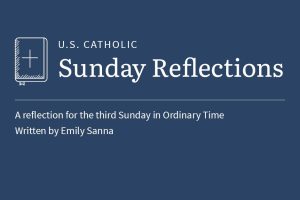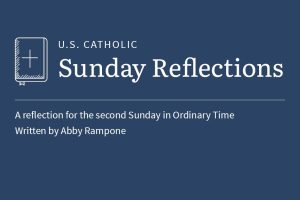The whispered prayers of a father make a lasting lesson for his daughter in this reflection from our archives.
I lie in bed thinking of the memories these walls hold. I'm visiting my parents, sleeping in my old room, and remembering a night 30 years ago just before I left home to join a religious order. I thought then that nothing would ever be the same, that the next time I returned things would be different at home and I would be different.
It's true. However, one thing has remained constant. As I lie in bed I hear the psst psst psst whispers of my father's prayers. My father's night prayers have been holding up the sky for as long as I can remember. I have memories, as a small child, of running into my parent's room and finding my father kneeling at his bedside saying his night prayers.
I've noticed in recent years that he now has his own altar. I think it has been there for years but I had never noticed it. It is not like my mother's altarcito with little statues and candles, pictures and mementos. His altar is simply a framed picture of Jesus.
He stands before it with his arms folded across his chest. I recognize that stance. That is how I imagine the ancient Aztecs standing before their gods.
Each night my father assumes his prayer stance and whispers to God his gratitude along with his concerns and petitions for each of us, his children and grandchildren, and for the world. I fall asleep comforted by the psst psst psst of my father's prayers and secure that all will be well with the world.
I often ask the students in my prayer and spirituality classes to talk about their spiritual models or mentors. Invariably, they will talk about their mothers or grandmothers. Very rarely does anyone think of or describe his or her father as a spiritual role model.
Is it that men are not considered spiritually oriented? Do we deny, overlook, or not recognize the ways that men express their spirituality? Do men themselves try to mask or hide their religious piety?
Some in our society still believe boys don't cry. Do boys also fail to openly express their spirituality?
I realize that I risk embarrassing my father with this description of his personal piety. It is not insignificant that he prays late at night when he assumes all of us are asleep and out of hearing range. His altar is in the same room where I watch television when I am home. I notice he starts getting restless when he is ready to retire and I am still in there. I know it's his prayer time and that he needs his privacy so I yawn and announce my departure.
While I don't really feel qualified to probe further into men's spirituality, I can comment on my experience of growing up seeing my father pray. I believe that I got the message early in my life that we depend on God for everything. If my father, who I believed could do anything, got on his knees every night and prayed, then surely God must be powerful.
Like most children I think that it was not until I left home and became an adult that I really came to appreciate the impact of the rich Latino Catholic environment in which I grew up.
My parents praying, the religious images throughout our house, the nightly bendicion (blessing) that we received from each of our parents before bed, the prayers we said together around the table, the family rosary–all contributed to a tangible sense of God's presence. From the earliest memories of my father praying by his bedside at night to the present, I know that my parents' prayers carry me through the day.
In my family we were seven children and, during that period when we were all still pretty young and rowdy, my parents would take turns going to Mass on Sundays. My father always went to Mass at 6 a.m. and, against my mother's objections, returned with a big bag of sugarcoated sweetbread from the Mexican bakery. We would eagerly await his return from church.
As we got older, we all went to Sunday Mass together, not necessarily in perfect harmony. In those times of one-bathroom houses, someone had always stayed in the bathroom too long and made someone else late. As we got even older and went our own way, my parents would have everyone over for menudo on Sunday mornings and quiz us about the Sunday readings at Mass.
Often when I call home on Sunday afternoons, my father will still get on the phone to ask me if I've been to Mass already. On those occasions when I have not been to Mass yet, I'm sure glad for the Sunday evening liturgy schedule in my parish.
Apart from times of private prayer and formal religious observance, my father's spirituality is most visible on the canvas of daily life. He is never too tired to comfort a grandchild, run an errand for my mother, or be present to us when we need him. Now that he is retired he has more time for "the things that really count," spending more time with each of us and with God.
Chapter 13 in the First Letter of Paul to the Corinthians describes love as patient and kind, with no limit to its forbearance, its trust, its hope, or its power to endure. That description fits my experience of my father. It is the legacy that he has given me and that will live on in the expression of my spirituality.
When I think of spiritual mentors or guides, I think of those people who both exhibit a deep spirituality and inspire us to seek that same "pearl of great price." I realize now that my father was one of my first spiritual mentors. By his example he taught me that we depend on God for our very life and that our life is for bringing the experience of God's love to others.
Thanks, Dad.
This article appeared in the May 2003 issue of U.S. Catholic (Vol. 68, No. 5, pages 40-41).













Add comment